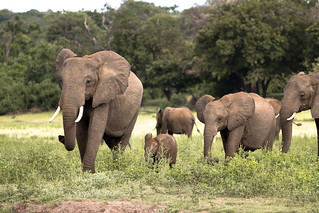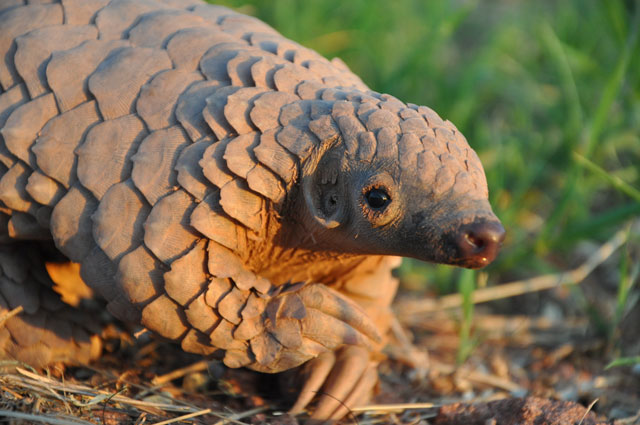跨足實體和電商市場的非法瀕危物種貿易,是規模龐大不容忽視的問題。今年第17屆華盛頓公約會議將從24日起在約翰尼斯堡舉行為期12天的密集談判,總計182個國家加上歐盟出席,訂定出管理全世界野生物的重要依據。
62個「加嚴」新提案 瀕危物種貿易將更難
華盛頓公約又稱瀕臨絕種野生動植物國際貿易公約(Convention on International Trade in Endangered Species of Fauna and Flora),簡稱CITES,是全世界最重要的野生物條約。
CITES會議每三年舉辦一次,今年第17屆(CoP17)是2000年來首次由非洲國家主辦,總計2500位代表和250個授權媒體參加。
象、獅、虎和犀牛,海洋中的鯊和魟,都是知名的瀕危野生物,其保育措施是CITES的重要議題。不過,CITES不只關心知名物種。華盛頓公約規範了超過3萬5000種動植物的貿易辦法。
此次CoP17上,與會代表將決定64個國家提出的62個新提案是否通過。
國際人道協會野生物部門主任特萊基(Teresa Telecky)博士表示,此次提案中有許多正面的「加嚴」提案,讓瀕危物種貿易更加困難。此外許多提案納入一般人較不熟悉的物種,包括穿山甲、鸚鵡螺、侏儒變色龍、壁虎、龜,以及15種紅木。
非洲象牙貿易再次搬上檯面
由於目前的象牙國際貿易禁令將在2017年底到期,三項關於非洲象(Loxodonta africana)的提案已經引發激烈爭論。
那米比亞和辛巴威提二案,希望放寬對非洲象牙貿易的管制,但遭其他國家反對。CITES秘書處和野生物監測網TRAFFIC建議會員國否決這些提案。
貝寧、布吉納法索、中非共和國等13國提出第三案,希望禁止所有的非洲象貿易。不過,根據CITES程序,會員國有權不支持這項提案。
TRAFFIC認為這對大象保育將造成反效果,讓非洲象處境更危險。
雖然大多數國家反對開放象牙貿易,歐盟卻還在觀望,舉棋不定的態度讓非洲象聯盟的29個非洲國家高度關注。

歐盟聲明指出,「由於象盜獵和象牙走私持續高漲,恢復貿易言之過早。但那米比亞在野生物保育和對抗走私上的努力不容忽視,也值得鼓勵。」
貝寧前農業部長、非洲象聯盟長老理事會會長Azizou El Hadj Issa則強調,「每天都有大象和巡守員遭殺害,象牙走私助長恐怖主義、使非洲情勢動盪,影響歐盟安全。我們需要歐盟和我們站在同一陣線,非洲人能解決這個問題,呼籲歐盟和其成員國支持我們的提案。」
穿山甲仍持續減少中 跨國貿易應全面禁止
儘管受到法律的保護,穿山甲仍然是全世界走私最嚴重的哺乳動物。原生於亞洲和非洲的穿山甲,於夜晚狩獵螞蟻,遇到危險時會捲成球狀。
雖因為寶可夢穿山王而爆紅,但全部八種穿山甲物種都有滅絕危機。四種亞洲種被世界自然保育聯盟(IUCN)名錄列為極度瀕危或瀕危。
穿山甲因為走私和棲地破壞而瀕危。人們非法狩獵穿山甲以取其肉和鱗片作為傳統藥材,取其皮做成皮包。瀕危的印度穿山甲(Manis crassicaudata)可以適應棲地改變,但大部分的棲地人口密度都非常高。印度動物學會2002年提報IUCN,指穿山甲快速減少、棲地劣化,農業擴張、灌溉作業和殺蟲劑都是穿山甲的生存威脅。
儘管CITES已經管制所有穿山甲物種,據IUCN穿山甲專家小組估計,穿山甲仍是地球上走私最嚴重的野生動物。
八種穿山甲都在CITES附錄二,所有貿易受管制監控,出口國必須證明未傷害野生族群,方可申請許可。
為了更嚴密地保護亞洲穿山甲,CITES對亞洲穿山甲實施零出口配額,不過仍可以科學研究的名義申請許可。四種非洲穿山甲可商業貿易,但仍需要許可。
穿山甲也受到棲地國的野生物法律保護。
CoP17會議將審核19國提出的五個穿山甲相關提案,如果通過,所有穿山甲國際貿易都將被禁止。CITES秘書處和TRAFFIC的共識也是五個提案全部接受。
本次華盛頓公約大會的官方視覺。圖片來源:CITES。
Illegal trade in endangered species, including internet commerce, is enormous – by any estimate. Far-reaching decisions on managing the world’s wildlife are about to be made here in Johannesburg, where 182 countries plus the European Union will gather Saturday at the Sandton Convention Centre for 12 days of intense negotiations.
Johannesburg will host the triennial conference of countries are Parties to the world’s most important wildlife treaty – the Convention on International Trade in Endangered Species of Fauna and Flora, usually called CITES (pronounced sigh-tees).
The 17th Conference of the Parties to CITES, CoP17, is the first hosted by an African country since 2000. About 2,500 participants and 250 accredited media will attend.
Elephants, lions, tigers and rhinos, and in the oceans sharks and rays, are well-known endangered wildlife species, and conservation measures for them all will be considered by CITES delegates. But, CITES is not just about well-known animals.
The CITES treaty makes rules for cross-border trade in over 35,000 wild species of plants and animals. CoP17 delegates will accept or reject 62 species specific proposals submitted by 64 countries.
Dr. Teresa Telecky, director, Wildlife Department, Humane Society International, is positive about many of the CoP17 species proposals.
“I have been doing this for 26 years and this is a meeting with a great many uplisting proposals,” she explained, describing “uplisting” proposals that make trade in endangered species more difficult.
Dr. Telecky is pleased that numerous proposals affect “species that are unfamiliar to many,” such as pangolins, nautilus, pygmy chameleons, geckos, turtles, and 15 species of rosewood.
Trade in African Elephant Ivory Again Proposed
Three proposals concerning the African elephant, Loxodonta africana, are already generating hot debate, as an existing global embargo on ivory sales is due to end in 2017.
The first two proposals involve Namibia and Zimbabwe. Led by Rowan Martin, Zimbabwe’s representative to CITES, these countries want CoP17 delegates to lift CITES trade controls on African elephant ivory.
Numerous countries oppose this approach. Both the CITES Secretariat and the nonprofit wildlife monitoring network TRAFFIC and have recommended that the Parties reject all three proposals.
The third African elephant proposal is brought by: Benin, Burkina Faso, Central African Republic, Chad, Ethiopia, Kenya, Liberia, Mali, Niger, Nigeria, Senegal, Sri Lanka and Uganda. This proposal bans all African elephant trade. However, CITES procedures give Parties the ability to “opt out” of the changes proposed.
The result, TRAFFIC believes, “would be counterproductive for elephant conservation and could place African elephants at greater risk.”
While many countries oppose opening the elephant ivory trade, the European Union is still on the fence, a position that is causing alarm in the 29 African countries of the African Elephant Coalition.
In a position paper, the EU said, “Given the continuous high levels of elephant poaching and illegal ivory trade, it is premature to agree on a resumption of trade. The efforts by Namibia for wildlife conservation and to combat poaching and illegal trade should nonetheless be recognised and further encouraged.”
“The situation is alarming in most of our countries,” says Azizou El Hadj Issa, former minister of agriculture in Benin and president of the Council of Elders of the African Elephant Coalition.
“Elephants are slaughtered every day, rangers are being killed and the trade is fueling terrorism which destabilizes the continent and has huge repercussions for EU security,” Issa warned at a meeting with EU officials in July. “We need the EU to support us and become part of the solution to this crisis. We, the Africans, have that solution and we call on the EU and its member States to throw their support behind our proposals.”
Pangolins Protected But Disappearing
Despite legal protections, pangolins (say pang-guh-linz) are the most illegally traded mammals in the world. Native to Asia and Africa, these mammals hunt at night for ants and roll up into a ball when threatened.
Gaining popular recognition as the basis for the Pokémon Sandslash, all eight species of pangolins are threatened with extinction.
The four Asian species are listed as Critically Endangered or Endangered by the International Union for Conservation of Nature, IUCN, on its Red List of Threatened Species.
Pangolins are vanishing due illegal trade and the destruction of their habitat. People illegally hunt pangolins for their meat, their scales, used in traditional medicine, and their skins which become luxury fashion accessories.
The Endangered Indian pangolin, Manis crassicaudata, for instance, can adapt to modified habitats, but a large proportion of its range has high human population density. The pangolins are experiencing rapid loss and deterioration of habitat, according to the Zoological Society of India, which reported to the IUCN Red List in 2002 that an increase in the agrarian economy, improved irrigation and the use of pesticides are additional threats to this species.
Even though CITES already regulates all species of pangolin, the IUCN Pangolin Specialist Group estimates that pangolins are “the most illegally traded wild animals on the planet.”
All eight pangolin species are listed under Appendix II of CITES, so trade is regulated and monitored and permits are required from exporting countries. To issue a permit, the exporting country must determine that this activity will have no detriment to the wild population.
As an added protection for the four Asian species, CITES imposed a zero export quota. Still, scientific and research uses can still be authorized by permit. For the four African species, commercial trade is not prohibited, but permits are still required.
Pangolins also are protected in their range states by domestic wildlife laws.
The delegates at CoP17 will consider five pangolin proposals, submitted by 19 countries, including the United States. If accepted, the proposals would ban all international trade in pangolins or their parts.
Again, the CITES Secretariat and TRAFFIC are in agreement — accept all five proposals.
※ 全文及圖片詳見:ENS





